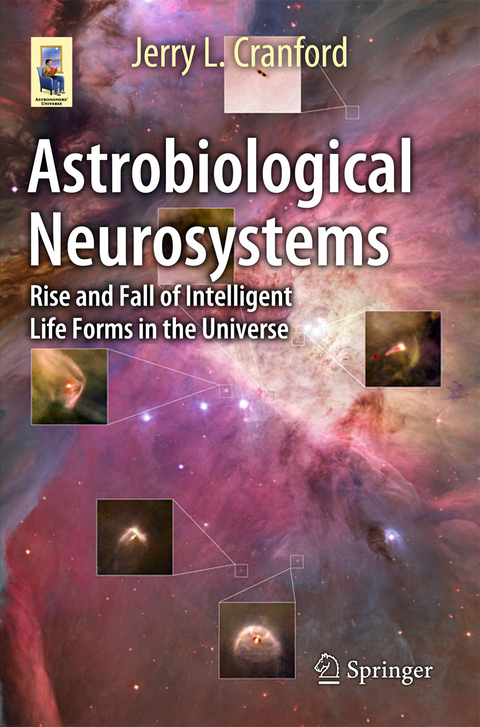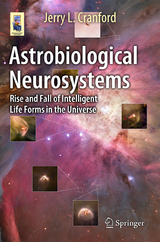Astrobiological Neurosystems
Springer International Publishing (Verlag)
978-3-319-10418-8 (ISBN)
The core of the book explains (and presents educated guesses) how nervous systems evolved on Earth, how they work, and how they might work on other worlds. Combining his knowledge of neuroscience, computers, and astrobiology the author jumps into the discussion whether biological nervous systems are just the first step in the rise of intelligence in the Universe.
The book ends with a description from both the psychologist's and the neuroscientist's viewpoints, exactly what it is about the fields of astrobiology and astronomy that "boggles the minds" of many amateur astronomers and interested non-scientists.
This book stands out from other popular science books on astrobiology by making the point that "astro-neurobiologists" need to begin thinking about how alien nervous systems might work.
Jerry L. Cranford, Ph.D, CCC-A, is a retired professor at the Department of Communication Disorders at Louisiana State University Health Sciences Center, New Orleans. He is an experienced neuroscientist/psychologist with an extensive background as a funded brain research scientist, and also a lifelong dedicated amateur astronomer whose primary interest is in the question of how intelligent forms of life might develop on other worlds in the universe. Dr. Cranford is attempting to combine his professional knowledge of the brain sciences with his knowledge of astrobiology to speculate on how alien life forms may develop neurobiological control systems that could be functionally analogous to those found in various animal species on Earth. He has extensive experience in writing articles and books for interested non-scientists and strives at making the scientific information he presents as accurate as possible but with a minimum of highly technical jargon.
Preface.- Scientists believe intelligent life may be more common in the universe than previously considered possible.- When will mankind achieve "First Contact" with extraterrestrial life forms.- If our nervous system is not the only one that exists in the universe, where are the others and how do we identify them?- Evolution of intelligent nervous systems on other worlds in the universe.- Are biological nervous systems just the first step in the rise of intelligence in the universe?.- Just how hostile is our universe to the development and survival of Life Forms?.- Some Final Thoughts from this "amateur" astronomer on mankind's imminent discovery that we are not alone in the Universe.- References and further suggested readings.- Index.
"The quintessence of this book is whether there possibly exist brains (central nervous systems) on other planets that might work the same or entirely differently from those found on Earth. ... For astro-neurobiological educated guesses, surmises, and ideas, this book is the first of its kind and offers a good read." (P. Chapman-Rietschi, The Observatory, April, 2016)
"The illustrations are excellent, and there is an extensive bibliography. Most of the subjects are covered in many other books, but the discussion of neurosystems is original and insightful. Summing Up: Recommended. General readers, lower- and upper-division undergraduates." (T. Barker, Choice, Vol. 52 (12), August, 2015)
| Erscheint lt. Verlag | 10.10.2014 |
|---|---|
| Reihe/Serie | Astronomers' Universe |
| Zusatzinfo | IX, 204 p. 87 illus., 68 illus. in color. |
| Verlagsort | Cham |
| Sprache | englisch |
| Maße | 155 x 235 mm |
| Gewicht | 338 g |
| Themenwelt | Sachbuch/Ratgeber ► Natur / Technik ► Weltraum / Astronomie |
| Naturwissenschaften ► Physik / Astronomie ► Astronomie / Astrophysik | |
| Schlagworte | Alternative Brain Chemistries • Artificial or Mechanical "intelligence" • Artificial or Mechanical “intelligence” • Evolution of Life on other Planets • Extraterrestrial Intelligence • Life Friendly Molecules in Outer Space • Mass Extinctions of Life on Earth • Nervous System Evolution in Animals • Non carbon-based Life Forms • Searching for Exoplanets in the Milky Way • Simulating Brain Function • Threats to Evolution of Life |
| ISBN-10 | 3-319-10418-7 / 3319104187 |
| ISBN-13 | 978-3-319-10418-8 / 9783319104188 |
| Zustand | Neuware |
| Haben Sie eine Frage zum Produkt? |
aus dem Bereich




